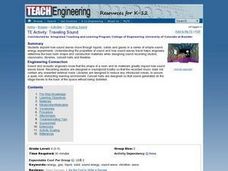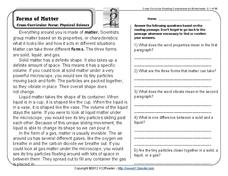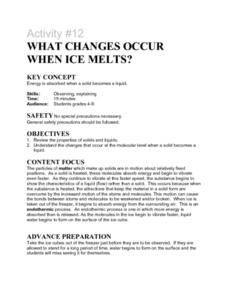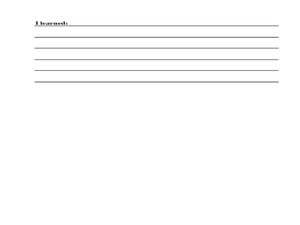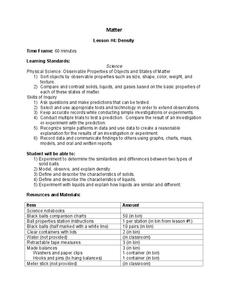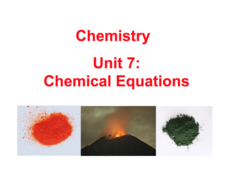Curated OER
Is Air a Fluid?
Students use baking soda, vinegar, matches, and other materials to pour gas. In this air lesson plan, students use the materials to pour gas and learn that air can be a fluid like a liquid.
Curated OER
Things Are Heating Up
In this science worksheet, students read about chemical changes. Students also answer 3 comprehension questions about the reading.
Curated OER
Water Unit
Students make boats and race them. In this physics lesson, students investigate surface tension, molecules, and cohesion by competing in a class race with their boats. Students experiment with liquid soap to see how much will make their...
Curated OER
Traveling Sound
Students explore how sound waves move through liquids, solids and gases in a series of simple sound energy experiments. They describe how sound needs molecules to move and that changing the medium that it travels through changes the...
Curated OER
Buoyant Force
Students investigate the scientific concept of why some objects float when put in a liquid solution. They apply the laws of motion and force while conducting classroom activities. Students also take notes and answer target questions to...
Curated OER
What is Sound? How Can We Change Sound?
In this instructional activity, students investigate the phenomenon of sound! Students compare and contrast how sound travels through solids, liquids, and gases. They explain how length and thickness affect sound. Students know the...
Curated OER
Density
In this density worksheet, students read a selection on density and answer 10 questions using the information from the selection.
Curated OER
Confectionary Bureau of Investigations: Case of the Cookie Mystery
Students perform tests on different chemicals to determine their chemical properties. In this forensic science activity, students identify an unknown sample using its physical and chemical properties. They solve a fictional crime using...
Curated OER
What is Matter?
Learners create a definition of matter. In this physical science lesson, students work in pairs to sort items printed on cards into several categories (matter, non-matter, and unsure) and agree on a definition of matter.
K12 Reader
Forms of Matter
In this forms of matter learning exercise, students read a 4 paragraph article about forms of matter, then complete a set of 5 short answer comprehension questions.
Curated OER
Construct with Solids
Students discover which properties of solids lend themselves to building a tower through hands on trial and error and observation of others as they are building. They write down the steps it took them to build the tower and label an...
Curated OER
What Changes Occur When Ice Melts?
Students explore the physical process of melting. They observe melting ice and answer questions related to energy transfer during phase changes.
Curated OER
Water Vapor Equilibrium
For this chemistry worksheet, students complete 12 short answer questions and problems on water vapor equilibrium. They calculate equilibrium concentrations of reactants and products.
Curated OER
Matter
Students complete a unit of activities to learn about states of matter and how to measure matter. In this matter lesson, students complete 8 lessons to learn about matter, its states, and how to measure matter.
Curated OER
Changing States of Matter - Making Ice Cream
Students make ice cream as a result of viewing changes of states of matter. In this matter lesson plan, students learn how heating and cooling can effect a state of matter to change.
Teach Engineering
Concentrate This! Sugar or Salt...
Heat up your lessons on boiling points. The resource provides a three-part activity: first, groups find the boiling point of solutions; second, they create boiling point curves for salt and sugar solutions; and third, they mix a solution...
Curated OER
Density
Learners predict when an object will float or sink based on comparison of density of the object to the density of the substance in which it is placed. The access a website and sketch the object in the first column of their table and then...
University of Georgia
Splat!
What does viscosity have to do with splatter? An activity shows that the viscosity of a substance is inversely proportional to the distance of its splatter. Learners conduct the experiment by collecting data, graphing, and analyzing...
Cornell University
Atomic Bonding
Explore the connection of surface area to bonding within atoms. Learners complete lab investigations to model changing surface area with different sizes and concentrations of atoms. A flour fireball demonstration follows the labs to...
Curated OER
Studying the Equilibrium of a Water System
In this equilibrium worksheet, learners perform a computer simulation on vapor pressure of water at different temperatures to answer 11 problem solving and short answer questions about the topic.
Curated OER
Temperature
Several slides compare different temperature scales. Thermal expansion, heat transfer, and Maxwell speed distribution are also explored. The last two slides seem unrelated to the topic of heat, but are easily left out of this otherwise...
Curated OER
Force and Motion
Students experiment with force and motion. In this force and motion instructional activity, students test gravity using a variety of objects. Students rotate through a series of stations which use force, motion, friction, and inclines....
Curated OER
WS 2.5 Dimensional Analysis
Science students apply dimensional analysis to relate quantities in six different problems. They consider the cost of steak, a young man's growth rate, a medicine prescription, fuel efficiency, and more. This worksheet is a great way to...
Normal Community High School
Chemical Equations
Viewers learn how to identify the substances in a chemical reaction, how to balance it, and the different types of chemical reactions by watching a presentation that also includes a review of monomers and polymers. The presentation...





